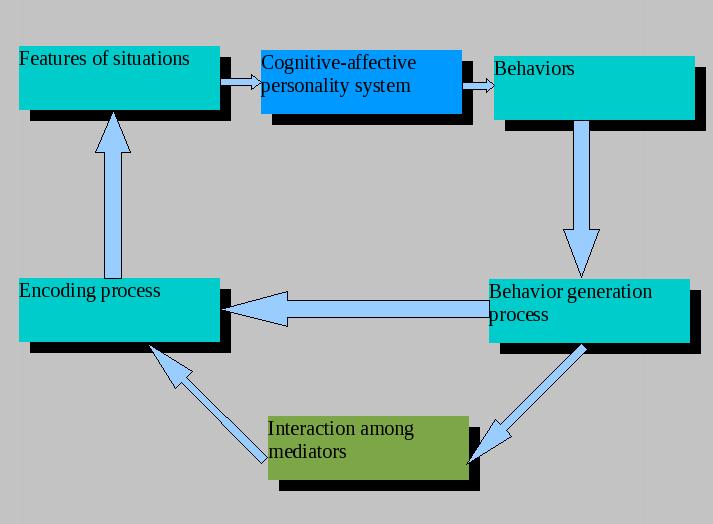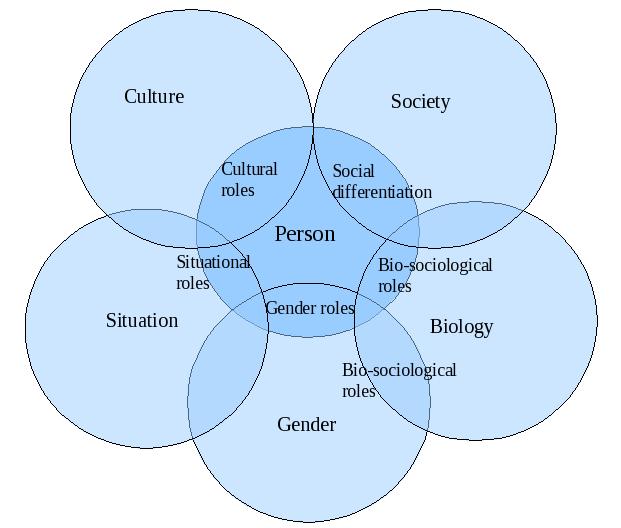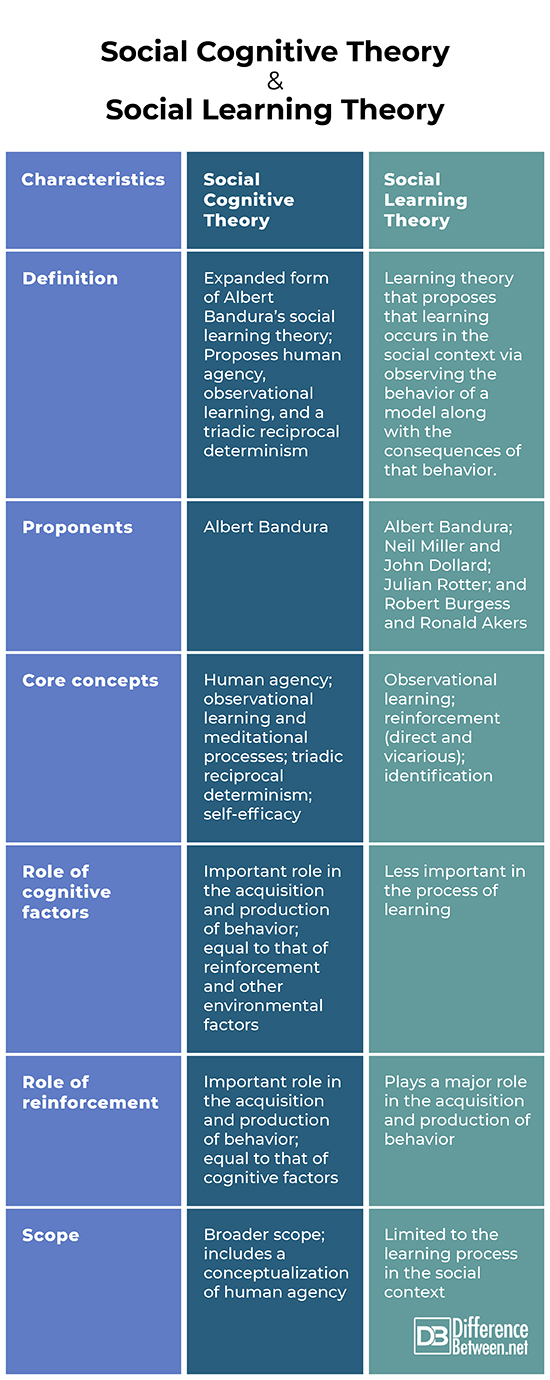Difference Between Social Cognitive Theory and Social Learning Theory
Social cognitive theory and social learning theory are theories that try to explain learning in the social context, with the main position being that people acquire new behaviors by observation. The two theories focus solely on behavior, in terms of what can be learned, setting aside other things such as knowledge or cognitive skills. The word ‘social’ refers to the influence of social interactions on how we acquire new behaviors which may not necessarily be social in nature, and how we perpetuate them. Both of these theories are rooted in behaviorist traditions in that focus on learned behavior and excluding thought and emotion. Still, both theories do acknowledge the cognitive processes that play a role in learning and behavior. The two are very similar in content, so similar that both are sometimes attributed to just one man, Albert Bandura.
Largely due to Bandura’s great contribution to social learning theory, it is difficult to differentiate it from social cognitive theory. As such, this article sets Bandura’s 1986 book entitled Social Foundations of Thought and Action: A Social Cognitive Theory as the delineation between the two. Although not by much, social learning theory is a fairly older body of knowledge while social cognitive theory has a broader scope. And while social cognitive theory can be attributed solely to Bandura, social learning theory is a collection of ideas from various thinkers. These two theories are discussed further in the following sections, along with a summary of how they differ.

What is Social Cognitive Theory?
The social cognitive theory is a learning theory which states that people acquire new behaviors by observing a model, and that personal (or cognitive) factors, the behavior itself and the environment (in the form of reinforcements) are engaged in a triadic feedback relationship, called reciprocal determinism, which influences the reproduction of the learned behavior. This theory was proposed by Albert Bandura officially in his 1986 book, Social Foundations of Thought and Action: A Social Cognitive Theory, and is an expansion of his take on social learning theory. He called it social cognitive theory to emphasize the role of cognitive factors (encapsulated under the personal factors) in the process of learning as well as to differentiate it from other social learning theories.
With social cognitive theory, Bandura broadens his social learning theory by starting with a conceptualization of humanity as having agency and capability, that is, humans are not just shaped by their environments and inner forces but also shape their environment and can regulate those inner forces. He maintains his major contributions to social learning theory, such as modeling, identification, and direct and vicarious reinforcement. He expands observational learning by adding onto it four cognitive processes that mediate learning, namely attention, retention, production and motivation. Finally, he adds the concept of self-efficacy, the personal belief in one’s own capability to plan and act accordingly in response to foreseeable situations.

What is Social Learning Theory?
Social learning theory is a cognitive-behavioral theory of learning which proposes that we acquire new behaviors simply by observing it along with its consequences. Although Bandura is credited with most of this body of knowledge, the entirety of social learning theory is a collective work from different people. The theory traces its roots to a combination of psychoanalytic and behaviorist concepts. In 1941, Neil Miller and John Dollard published a book called Social Learning Theory. In it they proposed that biological drives acts as stimulus for behavior which is in turn reinforced by social interaction. In 1954, Julian B. Rotter also published his book Social Learning and Clinical Psychology. Rotter theorizes that the emergence of novel behavior is a function of expectancy of a positive outcome and the behavior is reinforced by positive outcomes. Sociology also has its take on social learning theory. Edwin Sutherland’s Differential Association Theory was integrated into operant conditioning and social learning by criminologists Robert Burgess and Ronald Akers and they developed a comprehensive theory on how criminal behavior is learned. Throughout all this, cognitive perspectives maintain that a lot of novel behavior is acquired and reproduced even without repetition and reinforcement.
It was in this state of the social learning theory that Bandura conducted research on how novel behavior is acquired in the social context. Through his famous Bobo Doll Experiments Bandura came to the conclusions that are now basically the core concepts of modern social learning theory. First, learning occurs by observing the behavior of a model, which includes extracting information about the observation and deciding on performing the behavior (modeling or observational learning). Second, behavior can be reinforced by observing the consequences that happen to the model after the behavior was performed (vicarious reinforcement). Third, observation is a cognitive skill hence learning is a cognitive-behavioral process. Lastly, a learner observes and copies the model that he or she sees the most similarity with or has the most emotional attachment with (identification).
Difference between Social Cognitive Theory and Social Learning Theory
Definition
Social cognitive theory is the expanded form of Albert Bandura’s social learning theory which states that learning can occur by observing a behavior and that the manifestation of that behavior in the learner is regulated by the triadic reciprocal determinism between personal (cognitive) factors, the behavior itself, and by the environment (reinforcement). Meanwhile, social learning theory is a learning theory that proposes that learning occurs in a social context by means of observation of the behavior and the consequences that follow it.
Proponent/s
Social cognitive theory was proposed by Albert Bandura alone. Social learning theory is a collective work, with the most contribution coming from Bandura but with earlier contributions from Neil Miller and John Dollard, Julian Rotter, and Robert Burgess and Ronald Akers, as well as an influence from cognitive perspectives on learning.
Core concepts
Core concepts in the social cognitive theory are human agency, observational learning and its four meditational processes (attention, retention, production, motivation), triadic reciprocal determinism between cognitive, behavioral and environment factors, and self-efficacy. In social learning theory, the core concepts are observational learning, reinforcement (direct or vicarious), learning as a cognitive-behavioral process, and identification with a model.
Role of cognitive factors
In the social cognitive theory, cognitive factors play an important and equal role with environmental factors in the acquisition of new behavior and in its production. In social learning theory, the cognitive factors are only acknowledged to play a role in the acquisition of new behavior but not much or none at all in its production.
Role of reinforcement
In the social cognitive theory, reinforcement or environmental factors has an equal role with cognitive factors in the learning and production of behavior. In social learning theory, consequences and reinforcement play a major role in the acquisition and production of behavior.
Scope
Social cognitive theory has a broader theoretical scope as it includes a conceptualization of humans as agents capable of shaping their environment and of self-regulation. Social learning theory on the other hand is limited to tackling the learning process in the social context.
Social Cognitive Theory vs Social Learning Theory

Summary
- Social cognitive theory and social learning theory are very similar as learning theories. Their similarity is due in large part to the great contribution of Albert Bandura to these theories.
- Social cognitive theory is the expanded form of Albert Bandura’s social learning theory where he emphasized the role of cognitive factors in the process of social learning. He also added self-efficacy and conceptualized humans as active agents, capable of shaping their environment and of self-regulation.
- Social learning theory is a collection of works that explains the learning process in the social context. Much of social learning theory comes from the work of Albert Bandura that the current iteration of the theory is sometimes credited entirely to him.
- Difference Between Hematoma and Melanoma - February 9, 2023
- Difference Between Bruising and Necrosis - February 8, 2023
- Difference Between Brain Hematoma and Brain Hemorrhage - February 8, 2023
Search DifferenceBetween.net :
6 Comments
Leave a Response
References :
[0]Akers, Ronald L., and Robert L. Burgess. "A Differential Association-Reinforcement Theory of Criminal Behavior." Social Problems Vol 14, no. 2 (1966): 128-147. Print.
[1]Bandura, Albert. "Social Cognitive Theory: An Agentic Perspective." Annual Review of Psychology Vol. 52, no. 1 (2001): 1-26. Print.
[2]Bandura, Albert. Social foundations of thought and action : a social cognitive theory. Englewood Cliffs, New Jersey: Prentice-Hall, 1986. Print.
[3]Crain, William. Theories of Development: Concepts and Applications, 6th Ed. Essex, England: Pearson Education Limited, 2014. Print.
[4]Image credit: https://commons.wikimedia.org/wiki/File:Social_Roles.jpg
[5]Image credit: https://en.wikipedia.org/wiki/File:Cognitive-Affective.jpg

It effectively helpful
What a clear elaboration on the theories. Thank you.
Simplification at its best, very appropriate and much appreciated.
Simple, clear, and much appreciated.
Extremely helpful in understanding the concept and difference.
This was such a thought provoking differentiation. Makes it so easy for us to understand the nuances. Thanks for your interpretations of these works!